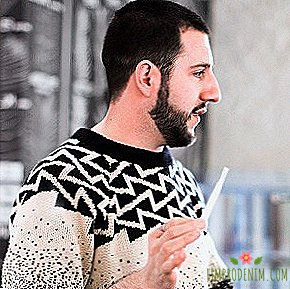Director of the Pushkin Museum of Fine Arts. A. S. Pushkina Marina Loshak about favorite books
IN BACKGROUND "BOOK SHELF" we ask journalists, writers, scholars, curators, and other heroines about their literary preferences and publications, which occupy an important place in their bookcase. Today, Marina Loshak, an art historian, curator and director of the State Museum of Fine Arts named after Sh. A. S. Pushkin.

 My reading maturity was strongly associated with the individual discovery of literature. Now everything is available and known: it’s enough to wander through the links - a lot of information and even more experts who help to figure it out. Then the literature was a cipher, and it was necessary to move in this world by touch - reading was like a constant sifting out of golden sand on a large shore.
My reading maturity was strongly associated with the individual discovery of literature. Now everything is available and known: it’s enough to wander through the links - a lot of information and even more experts who help to figure it out. Then the literature was a cipher, and it was necessary to move in this world by touch - reading was like a constant sifting out of golden sand on a large shore.
Like all children of my generation, I read the books randomly and unforgivably early. When I was not yet eight, I read all 12 volumes of Maupassant, which stood in a prominent place. I just stumbled upon it, literally fell. Before that, the whole boyish library had already been read: Cooper, Reed, Vern - and there was nowhere to go. I read Maupassant before my father saw and hid the book in the pantry of our huge family apartment in the center of Odessa. I found him among the cans, and next year I read the whole of Zola, it is not clear why. These were adults and incomprehensible people to me, whom the world wanted to touch as soon as possible. In Maupassant, everything was penetrated by barely perceptible erotic things that actually overwhelm the children's world. For as long as I can remember, I was in a state of being in love with someone.
When I studied at a philologist and started working in a museum, the words and concepts of the “curator” were not yet there, but I always tried to combine text and visual culture in my work. Now I feel closer to the artist than to the researcher: instead of a scientific career, I very early chose the museum business and conducted with artistic images - in visual art and literature - for decades. In my opinion, a talented reader is an incredible rarity and a certain gift, like a talented viewer. To read, present and observe, you also need a special warehouse of personality. The text has its own laws of visualization. The interpreter for me has always been no less important than the researcher. Yes, interpretations occur on a more sensual level, but they allow one to emotionally grasp what science is not obvious.
I became a linguist not quite consciously, my life was filled with hormonal joys, and the choice of a future specialty seemed not at all a priority. I loved to read, wrote poems, they worried me, my writings were the best - something pushed me into literature, but I had no trace of the researcher's reflection. We did not think about the profession and earnings, we lived like Buddhists today. I would like to live like this now.
Some books appear in my life with enviable regularity and are associated with an internal pause and even seasons. For example, for many years I have been reading Tolstoy’s "War and Peace" in winters with a whole piece. For some reason, I need it in the winter, probably enshrined in a children's stereotype and eventually turned into a mandatory ritual. I remember well when I was little and had been ill for a long time, I always read Dickens - 24 volumes in my home library were restored. At other times, when I tried to touch Dickens, he seemed to me gloomy and tedious - such a paradox. Children's disease is generally a very sweet feeling associated with a book, a hot-water bottle, a clean bed sheet, mom's tenderness, the hassle of the whole family and their pity and treats. And most importantly - you are completely free at this moment.
Now I am a 100% paper man and, besides my current list, I constantly read books on psychology and esotericism, management, listening to the opinions of friends. This is a reading-education parallel to the tasks of life, which is also incredibly important and interesting to me. The older our friends and the more conscious their path, the more willing they are to share their hobbies and better talk about the things that change them. Very often a suitcase is packed with books or a book travels with me on the subway, where I also spend a lot of time.
My current library is a product of spontaneity. My husband and I treat the library as part of us: our criteria are of a sentimental-tactile nature. At some point we agreed to collect our children's libraries and unite them in a common apartment. The point is clearly not only in the content, but in the fact that the presence of Shakespeare in that very edition is a return to his home. The first thing we always did when entering a new apartment was buying a bookcase. This is our home, what could be more individual?
Any book list that we make at some point in life — the message almost always comes from an unexpected request — this is the list of today. It can be completely different in the morning and in the evening, because we do not change during life — but within a few hours if we are mobile and internally young.

Correspondence of A. S. Pushkin with P. A. Vyazemsky
The correspondence genre is basically my - I love him very much. Letters for me are a source of inspiration, harmony, understanding and conversation of non-random people. Any volume of correspondence you do not read totally, like a novel, but constantly return to the beloved and special. This is an ideal meditation, unconscious at the moment of choice - you just come to this book and stay with it as needed.
Pushkin - my idol and beloved friend: I feel it that way. Everything connected with Pushkin’s circle, his epoch and the ideas of Decembrism has been my theme since early youth. For some reason, I feel close to these people — in their fabric of life, sense of humor, principles, and personal motivation — closer than contemporaries. Vyazemsky is a completely exceptional figure in which everything is connected: education, strict principledness, wonderful and non-superficial irony, friendship with Pushkin. Now I feel my connection with Vyazemsky, especially because in our future Museum Quarter there is a house in which he was born. So there was a special metaphysical involvement.
Yuri Olesha
"Envy"
I have my love affair with Olesha. When I first started working, I ended up at the Odessa Literary Museum as a junior research assistant. It was a new institution: very young people started building a museum: I was twenty years old. Our department was engaged in literature of the 20s, and Olesha and the entire South Russian school — Babel, Ilf and Petrov, Bagritsky — occupied me extremely at that moment.
I know Olesh thoroughly: both as a character and as an author. I touched a huge amount of his intimate things, collecting them for the museum and being a kind of mediator for Olesha. I am familiar with all the people who surrounded him and were friends with him - I spoke with Shklovsky, I visited Kataev many times and I feel him as a person very sharply and modernly. This is an absolutely dramatic figure. In fact, Olesha is a writer of an important novel, Envy is his largest work and a real monument to the generation. This thin book promised a very large writer who wasn’t realized on the scale he was supposed to.
Mikhail Zoshchenko
Stories
Another of my basic joy and character of my youth. I was interested in Zoshchenko as a literary critic and a museum worker, and I also understand more about him than just writers who are enthusiastic fans. Another tragic figure, on the one hand, with a very Russian destiny with Western views. Europeanness, combined with Russian karma, is what makes the generation of these writers very dear to me. The language strongly influences the influence of Hoffman - one of the favorite authors of Zoshchenko.
Mikhail Lermontov
"Hero of our time"
Regarding Lermontov and Russian classics in general, in my case there is one pattern. When I read modern art prose and everything around the "Big Book", I very often everything becomes clear pretty quickly. There is an instant and keen feeling that I need new impressions with something to seize. It is the exact word to seize. Neutralize - like soda vinegar. And when I need to seize, the 19th century comes to the rescue. It’s not necessary to read the “Hero of Our Time” as a whole: I constantly return to it in fragments. This is my medicine, "smekta" in relation to modern texts - reading Russian classics aligns me.
Ivan Bunin
"Dark alleys"
This collection is one of my favorite medicines. I adore him and can read by heart, touch to tears. The figure of the author always influences me. Bunin is a difficult and beautiful character. What claims can we have against writers who lived in a different era and were forced to feel the whole historical context in their own skin? No one has the right to say a word about Russian authors of the first half of the 20th century. Bunin was very consistent in his actions, but with a heavy temper. On the other hand, light character is generally a rare human trait. I can build myself in such a way that, with age, I am very calm towards all the weaknesses of people — including great writers — and I see this as a moment of inner growth.
Jonathan Swift
Gulliver's Travels
Swift had a tremendous impact on me: I pushed my imagination and understanding of difficult life issues. At five years old, this book reads like a fairy tale, at thirty - as a major philosophical work. There was no Harry Potter then, and I was running around with Swift, I hadn’t looked up from him for months. It is impossible to imagine, but the current children after Rowling with great difficulty will read the youth library of our generation. I really want Swift to continue being a childish reading too.
Henry Longfellow
"Song of Haiwat"
The magic text in my favorite translation - Kipling, whom I loved very much, could be here. I read the “Song of Haiwat” now in the original, trying to learn English better, and I know the Russian version by heart. This is another of my early childhood impressions, which has not disappeared anywhere with age. I am one of those who are convinced that fairy tales, myths and legends are a necessary stage of reader development that cannot be jumped over like a rung. Reading fairy tales - how to crawl. It turns out that children who crawl a little and immediately get up and go grow not like the majority - not worse and not better, but just completely different. Reading fairy tales in adulthood is absolutely entrancing.
Ernest Hemingway
"A holiday that is always with you"
Hemingway is a time code that generates a generation of readers. If you remember what happened to me in literature and what formed me - without Hemingway, nowhere. And without Remarque, too, is a time reflex, true, childish and superficial for me personally. This writer is part of the reflection and sentimentality of our generation and visual culture. Hemingway stayed with me for a long time, but for some reason I do not re-read Salinger, although they are often listed separated by commas.
Marina Tsvetaeva and Osip Mandelstam
Poems
I had an acute need for poetry in my youth - I think this is a feature of the total state of youth, as Buddhists say. It was a concentrate that so easily correlated with my sense of self and peace. Up to 24 years old, I literally fed on poems — Brodsky, Tsvetaeva, Mandelstam, and the whole Silver Age were my jewel. Later, I began to live with vinyl records: my husband and I constantly listened to poets who read their own poems. Summer, June, fluff flies, a wonderful time of the year, and David Samoilov is always around our family - like favorite music. Now nothing similar in life can be and this state will not return.




